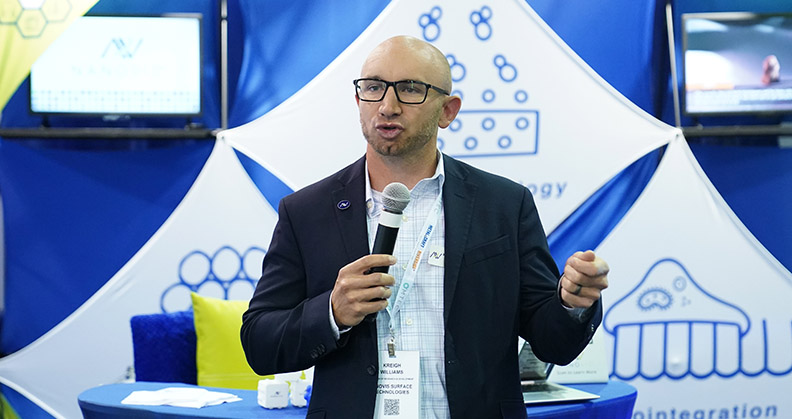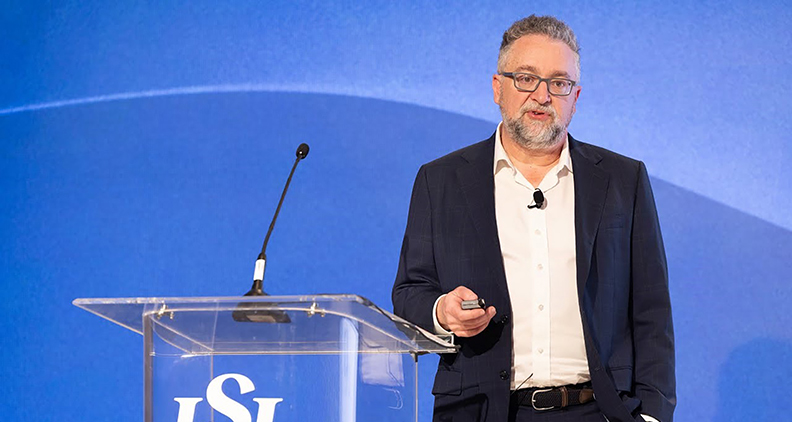
Orthopedic companies continue to advance their technical capabilities to remain competitive in a digital world. Artificial intelligence (AI) is improving productivity levels and informing the future of patient care. Smart implants are monitoring and improving how fractures are fixed. Surgical robots and navigation platforms are standardizing joint replacement outcomes.
As workplaces evolve into high-tech hubs of innovation, human connectedness will become more important and valued, noted Peter Cardon, Ph.D. He said employers are emphasizing soft skills — emotional intelligence, interpersonal communication and integrity — to build healthy workplace cultures.
Dr. Cardon, Professor of Clinical Business Communication at USC Marshall School of Business, has spent many years exploring how technology impacts communication. About five years ago, he teamed with a small group of researchers to analyze AI through a futuristic lens, anticipating its widespread impact a decade from now.
The explosion in popularity of ChatGPT changed the calculus of his research. AI suddenly felt immediate and tangible rather than distant and speculative. In recent years, Dr. Cardon and his colleagues have spent countless hours conducting interviews and surveys and writing about the implications of AI on management, communication and productivity in the workplace.
He believes that employees want their leaders to be transparent about the ways in which technology will impact them, some of whom might fear losing their jobs to computers and chatbots.
“A proactive, value-based approach sends signals that in this uncertain moment, leaders are trying to control what’s most important to the organization,” Dr. Cardon said.
Human interactions that foster a sense of trust and authenticity are more valuable than ever, Dr. Cardon noted. At the end of the day, he said, employees want to know that leadership is acting in their best interest.
People Matter Most
Dr. Cardon’s recent research, which he published in Sage Journals, presented the survey results of 692 business professionals who are frequent users of generative AI. Nearly 80% of the respondents said integrity will become the most important skill in the age of AI. They also identified character, strategic vision, the ability to inspire others and motivation and drive as key traits.
“I attribute this to be a recognition that incorporating AI into the workplace requires careful oversight grounded in high moral values and interpersonal trust,” Dr. Cardon said.
Dr. Cardon’s study also noted that 72% of business leaders believe oral communication skills will increase in importance, and written communication skills will become less important as AI becomes better at writing than a human would.
Dr. Cardon believes it’s important for leaders to prioritize face-to-face interactions, team discussions and opportunities for collaborative work to help employees feel a sense of connection and authenticity. He noted that the leaders he’s interviewed said conversations and meetings with team members help them realize how employees understand and are engaged in their work.
Regular and transparent conversations among colleagues build trust and integrity within the team, according to Dr. Cardon. He said town halls, held in person or virtually, carry greater importance as a platform for leaders to inform their staff about company-wide initiatives and receive immediate feedback from staff members.
Leadership characteristics that workers appear to crave more than ever is a sense of sincerity and authenticity, and that’s displayed during discussions better than in written communications, Dr. Cardon said. “Talking is a much richer communication channel,” he added. “It’s an easier way for employees to get a sense that their leaders are sincere and authentic.”
His research has overwhelmingly shown that people who use AI the most are the ones who also understand that adoption of the technology presents an opportunity to create a more people-centric workplace.
“They want to create an environment in which AI is used to make teams more productive and creative,” Dr. Cardon said. “They also repeatedly told us that interpersonal skills are more important than ever. It’s been a very durable finding.”
High-tech Inflection Point
Dr. Cardon consistently hears that this is a pivotal moment for company leaders. They recognize that AI capabilities are evolving rapidly, leading to concerns about future applications and the ways the roles of their staff might change over time.
“This combination of excitement and anxiety underscores the need for proactive leadership in addressing AI’s implications,” Dr. Cardon said. “People are looking for leaders who can articulate a clear vision for how the technology aligns with the organization’s values and goals.”
Rather than reacting to AI developments, staff members want leaders to lead the conversation, fostering transparency and guiding the company toward a future that embraces technology.
The rapid rise of AI provides a glimpse into how impersonal platforms will impact workplaces of the future, according to Dr. Cardon.
“Active users of technology understand this trajectory,” he said. “Their emphasis on improved oral communication, heightened integrity and a more strategic vision carry significant weight. I value their perspective.”
He believes it’s essential for leaders to collaborate closely with HR teams to anticipate the organizational needs arising from technology integration and to strategize about how employees can acquire the necessary skills to use new platforms to the fullest potential.
Dr. Cardon also advises fostering intentional communities of practice where individuals can share experiences and insights regarding technology tools. These communities provide valuable opportunities for honing ever-important communication skills and exchanging knowledge in this transformative era.
Frequent users of transformative technologies such as AI feel like most people underestimate the impact it will have on the workforce in the immediate future, Dr. Cardon noted.
“Organizations that are on a path of growth and understand that they will have an AI-enabled workforce in the next two or three years will be at a competitive advantage,” he said. “Companies that wait to integrate the technology will already be way behind.”
DC
Dan Cook is a Senior Editor at ORTHOWORLD. He develops content focused on important industry trends, top thought leaders and innovative technologies.




